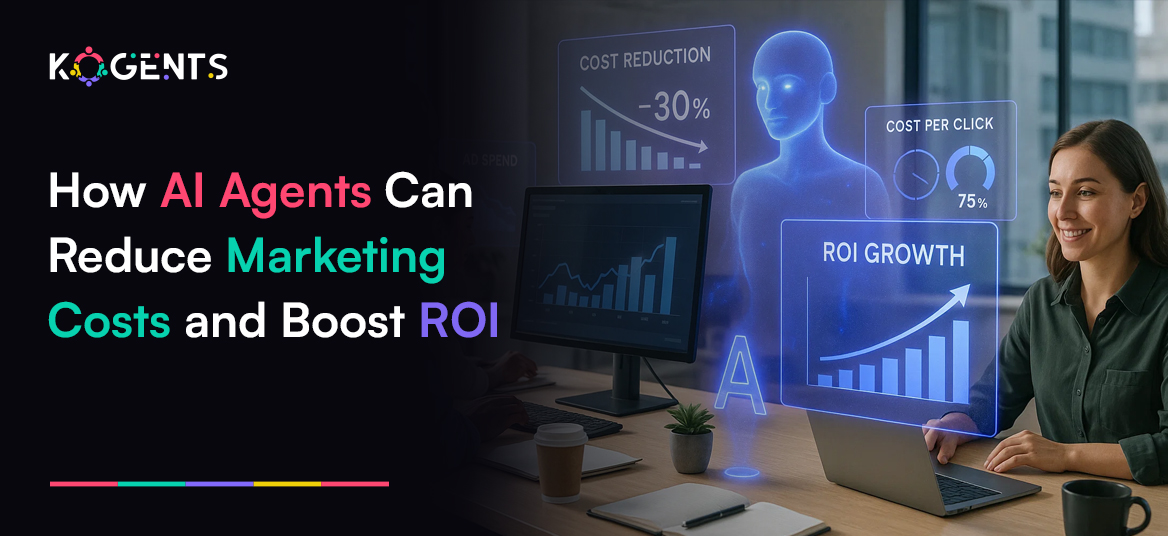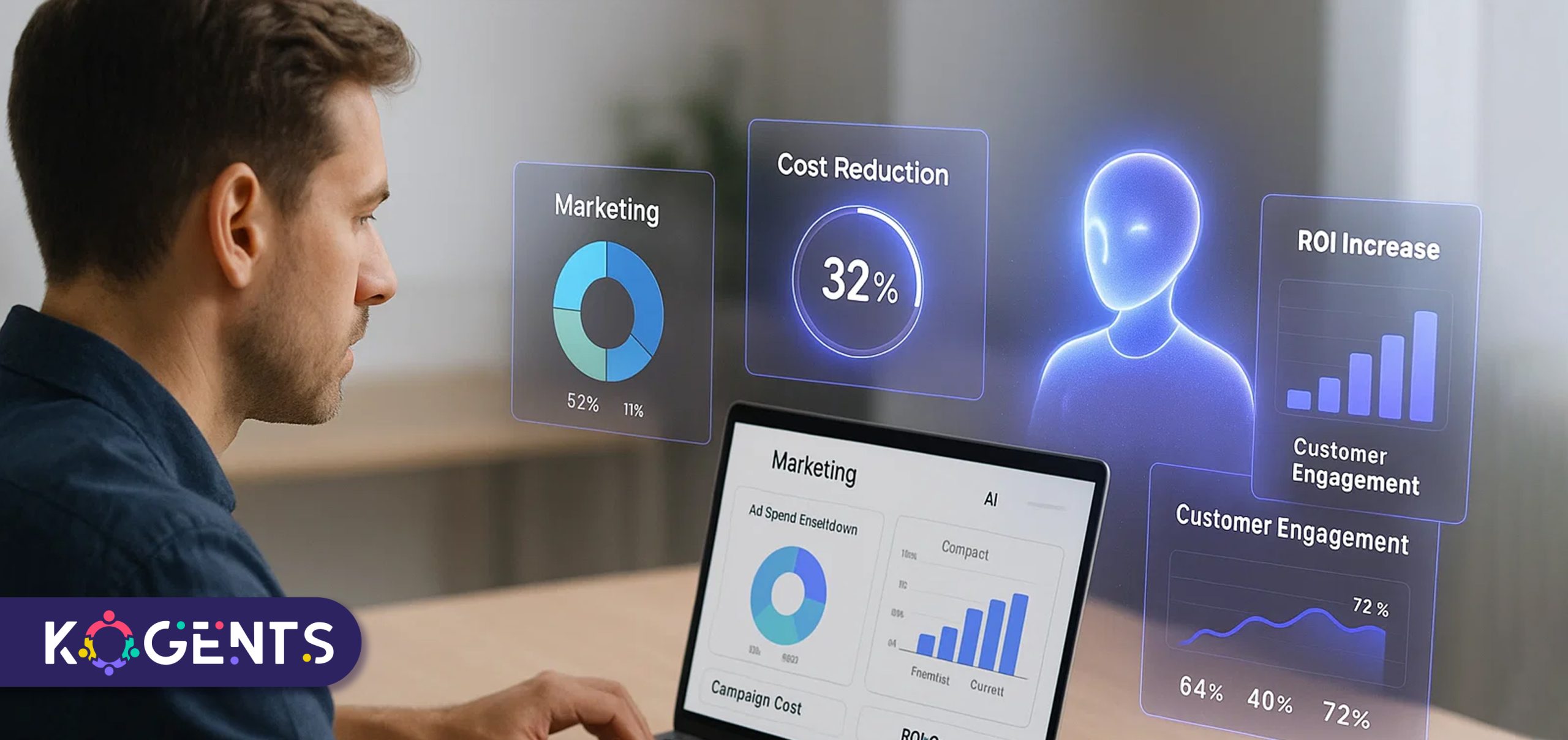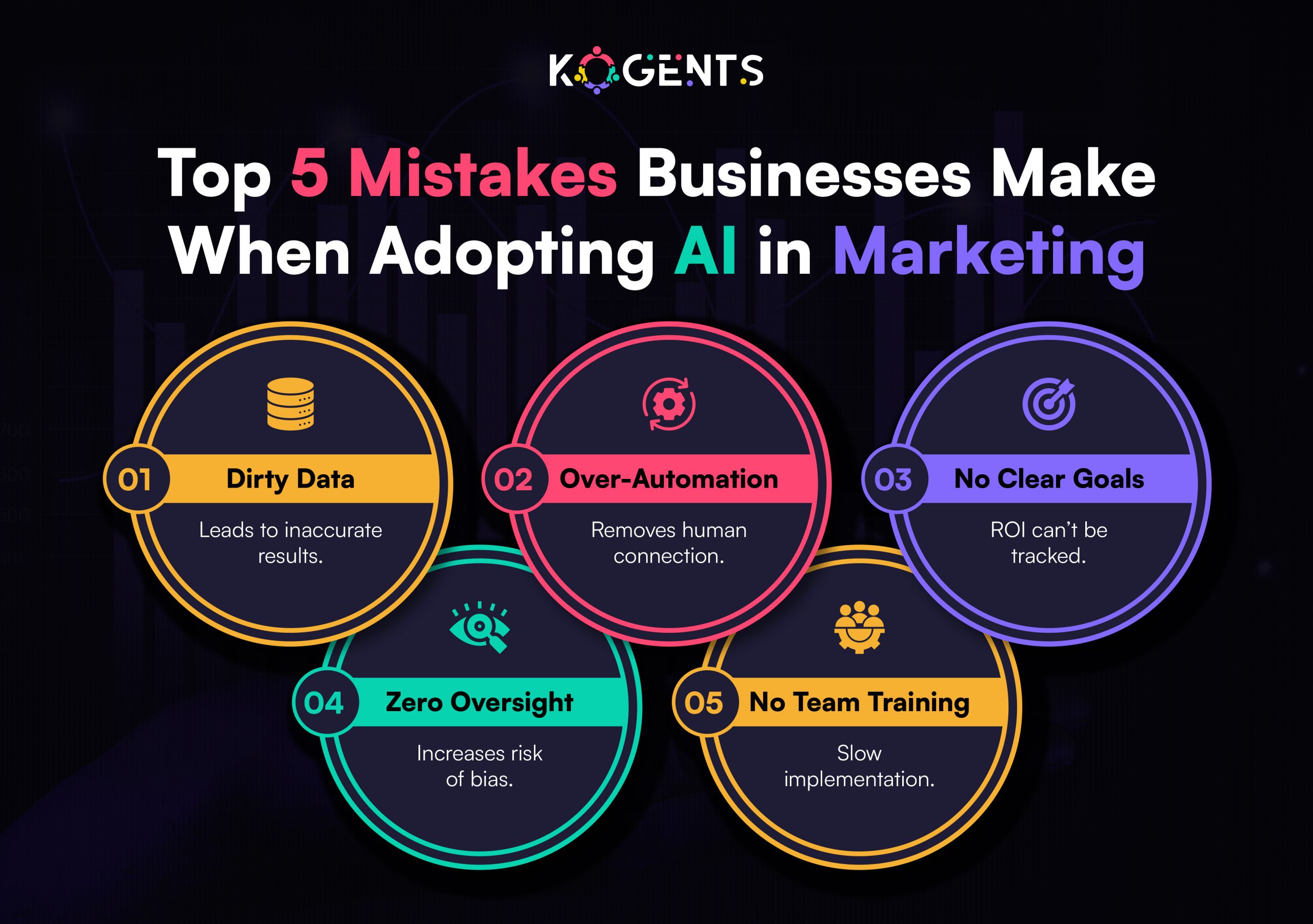How AI Agents Can Reduce Marketing Costs and Boost ROI

Summary:
Marketing isn’t just an expense; it’s often the lifeline of growth.
For entrepreneurs, solopreneurs, mental health experts, educators, and lifelong learners, every marketing dollar must be worth every count. Yet, traditional campaigns often feel like throwing money into a black hole, budgets disappear fast, and insights on what truly drives results remain blurry.
But, it’s not the same anymore! With the advent of AI and marketing, a powerful alliance is transforming how businesses attract, engage, and retain customers.
Today’s AI marketing tools give even the smallest teams superpowers: automating repetitive tasks, running predictive analytics, and delivering hyper-personalized experiences once reserved for enterprise players.
In this guide, we’ll explore how AI agents slash marketing costs and supercharge ROI, no matter your industry or team size.
Key Takeaways
- AI agents cut costs by automating manual marketing tasks.
- Hyper-personalization boosts engagement and conversion.
- Predictive analytics ensure better spend allocation.
- Entrepreneurs, educators, and clinicians can achieve enterprise-grade results without enterprise budgets.
What Are AI Agents in Marketing?
At their core, AI agents are intelligent software programs that can take input, analyze data, make decisions, and execute tasks, all with minimal human intervention.
In the context of marketing AI, these agents can perform tasks like:
- Identifying target audience segments through customer segmentation.
- Generating ad copy using natural language generation.
- Optimizing campaigns with real-time A/B testing and attribution modeling.
- Providing hyper-personalized recommendations to improve conversion rates.
Think of AI agents as virtual team members who work tirelessly to optimize every step of the funnel, from content creation and social media marketing to email marketing automation and campaign optimization.
Why Entrepreneurs, Solopreneurs, Mental Health Experts, and Learners Need AI Agents?
When you’re running a business or a personal brand on your own, every minute and dollar counts.
Entrepreneurs and solopreneurs often juggle strategy, content creation, client acquisition, and delivery simultaneously.
Similarly, healthcare professionals and educators are busy serving patients or students, leaving little time for marketing experimentation.
Here’s why AI agents matter:
- Time Efficiency: AI handles repetitive tasks such as scheduling posts, segmenting email lists, and running analytics, freeing you up to focus on strategy.
- Cost Savings: Instead of hiring multiple specialists, one AI marketing solution can cover campaign management, copywriting, and data analysis.
- Better Decisions: AI uses data, not guesswork, to guide marketing spend, helping you double down on what works and stop wasting budget.
- Scalability: AI grows with you, enabling even solo practitioners to operate like larger organizations.
- Improved Outcomes: For mental health experts, AI can tailor outreach messaging to resonate with patients. For educators, AI can recommend content that engages learners.
The bottom line: AI for marketing democratizes access to sophisticated growth strategies that were once reserved for enterprises.
Mini Case Study: A small telehealth provider reduced administrative overhead by 40% using AI to triage patient queries, allowing staff to focus on high-value consultations. Meanwhile, a YouTube educator used AI to test thumbnail variations and doubled click-through rates.
Role of Cost Reduction by AI Agents in Business, Healthcare, and Education?
AI agents are most powerful when applied to cost-sensitive functions like marketing, patient engagement, and student outreach. By combining automation, data science, and adaptive learning, they directly tackle the inefficiencies that inflate marketing budgets.
Data-Driven Spend Optimization
AI agents analyze advertising channels, keyword performance, and audience segments in real time.
They automatically pause underperforming campaigns, preventing wasted spend.
In education, this means stopping ads for courses that attract low-intent users and re-investing in high-enrollment keywords.
Predictive Targeting and Personalization
An AI agent for marketing uses machine learning models to forecast which leads are most likely to convert, allowing entrepreneurs to spend less on broad targeting
Healthcare clinics can focus outreach on patients who are overdue for appointments, improving health outcomes and reducing the cost of re-engagement.
Workflow Automation for Labor Savings
AI-powered systems handle segmentation, scheduling, copy generation, and A/B testing, freeing up human staff for high-value strategic work.
This leads to measurable cost savings. Forrester research shows automation can cut campaign execution time by 40%.
Outcome Enhancement Through Continuous Learning
Because AI agents learn from every click, email open, and engagement metric, they improve campaign results over time.
Businesses see compounding ROI gains, while educators witness better course completion rates thanks to timely learner nudges
Use Cases In Reducing Marketing Costs and Boosting ROI
AI agents are not theoretical; they’re already delivering measurable savings across industries.
Entrepreneurs & Solopreneurs
- Lead Scoring & Qualification: Automate lead nurturing sequences, perform customer segmentation, and even generate weekly content calendars.
- Content Calendar Generation: Save hours weekly by auto-generating blog and social schedules.
- Dynamic Pricing: Adjust prices based on demand, reducing discount reliance.
Case in Point: A solopreneur coach reported a 3x increase in leads after using AI tools to personalize webinar invitations based on audience behavior data.
Healthcare Providers
- Patient Segmentation: Target campaigns only to relevant patient groups, reducing blanket outreach costs.
- Automated Reminders: Decrease no-shows and lost revenue.
- Predictive Sentiment Analysis: Use predictive modeling to identify at-risk patients and proactively engage them. AI-powered virtual assistants reduce phone traffic by answering common questions.
Mini Case Study: A small mental health clinic implemented AI-powered patient outreach and reduced marketing expenses by 33% while increasing appointment bookings by 18%.
Education & Learning
- Personalized Enrollment Campaigns: Market courses to students most likely to register.
- Adaptive Retargeting: Build adaptive learning paths for students, automatically grading assignments and suggesting supplemental material.
- Progress-Based Nudges: Increase course completion rates, boosting student lifetime value.
Example: a micro-SaaS founder saw CAC drop by 28% after deploying AI-driven ad optimization that reallocated spend in real time.

How AI Agents Reduce Marketing Costs and Boost ROI?
AI agents don’t just make workflows more efficient; they directly impact the bottom line by reducing wasted spend and driving measurable growth.
1. Reducing Paid Media Waste
AI-powered predictive analytics helps businesses identify underperforming ads early and shift spend to higher-performing campaigns.
According to a McKinsey study, predictive targeting can increase marketing ROI by up to 20–30%.
Case Study: A telehealth provider used AI to analyze patient acquisition channels and discovered that 60% of their ad spend was going to keywords that generated few appointments. After the AI agent reallocated the budget to high-performing terms, cost-per-acquisition dropped 35%.
2. Automating Time-Intensive Tasks
AI-driven campaign automation saves countless hours by scheduling posts, segmenting lists, and running A/B tests in real time.
For small businesses, this can mean thousands of dollars saved annually in labor costs.
Example: A solo educator automated email drip campaigns for a new course launch.
The AI handled segmentation and timing, reducing manual work by 15 hours per week and increasing conversions by 28%.
3. Improving Personalization to Increase Conversions
AI agents leverage hyper-personalization to deliver tailored messaging. Gartner reports that personalization can lift conversion rates by up to 50%.
Personalized subject lines alone can boost open rates by 26%.
Mini Case Study: A mental health clinic used AI to send custom mindfulness tips based on patient engagement data.
This increased follow-up appointment bookings by 22%, reducing churn and boosting lifetime value.
4. Enhancing Attribution and Budget Allocation
AI provides real-time, multi-touch attribution models that help businesses understand which channels drive the most revenue.
This reduces guesswork and maximizes every dollar spent.
Example: An edtech startup discovered through AI-driven attribution modeling that referral traffic converted at twice the rate of paid ads.
They shifted strategy, reducing ad spend by 25% while maintaining revenue growth.
5. Driving Continuous Optimization
Unlike static dashboards, AI agents constantly learn. They improve recommendations and campaign efficiency over time, leading to compounding ROI gains.
Key Metric: Businesses using AI-driven marketing optimization have seen 15–20% lower customer acquisition costs (CAC) and up to 30% higher marketing ROI year-over-year.
Challenges & Limitations
While powerful, AI agents come with caveats:
- Data Privacy: Sensitive healthcare or student data must be protected under regulations like HIPAA and FERPA.
- Bias & Fairness: AI must be monitored to avoid perpetuating bias in marketing or educational recommendations.
- Human Touch: Automation should enhance, not replace, human connection, especially critical in therapy and education.
- Initial Investment: High-quality AI tools can have upfront costs and require onboarding time.
- Ethical & Regulatory Risks: Non-compliance can lead to fines or reputational damage.
Pro Tip: Use platforms that offer transparency (Explainable AI) and ensure a human-in-the-loop approach for critical decisions.

AI Agents vs Other Tools
| Feature / Tool | AI Agents | Traditional Automation Tools | Human-Only Approach |
| Decision-Making | Adaptive, data-driven | Rule-based only | Intuition-driven |
| Personalization | Hyper-personalized at scale | Basic segmentation | One-to-one only |
| Cost Efficiency | High (reduces human labor) | Moderate | Low |
| Learning Capability | Improves over time (ML models) | Static | Human learning only |
| Real-Time Optimization | Yes | Limited | Very slow |
| Scalability | Scales instantly | Limited | Requires more staff |
Future of AI in Marketing
The future of AI agents promises to make cost reduction and ROI improvement even more seamless and autonomous.
Autonomous Campaign Management
Next-generation AI agents will not only optimize campaigns but also design them from scratch.
Using generative AI, they will draft ad copy, select creative assets, allocate budget, and adjust bids in real time, all without human intervention.
This means entrepreneurs and educators will be able to launch sophisticated campaigns with minimal overhead.
Multi-Modal Personalization
Future AI will integrate text, voice, image, and behavioral data to create highly contextual experiences.
Imagine a mental health platform sending a personalized video tip or an education platform delivering AR-based learning reinforcement right when a student is likely to disengage.
| Key Fact: Companies like Netflix and HubSpot continue to invest in AI-powered marketing automation, it’s clear that this technology is becoming a cornerstone of modern marketing strategies. |
Proactive ROI Monitoring
AI will shift from reactive reporting to proactive recommendations.
Agents will alert users when CAC is rising or when a campaign is underperforming, providing actionable steps to fix the issue instantly.
Integration with Predictive Market Trends
By analyzing macroeconomic and seasonal data, AI agents will forecast market conditions and adjust spending ahead of time.
For example, a healthcare clinic could anticipate flu season and ramp up vaccination campaigns automatically.
Industry Outlook: Gartner predicts that by 2027, marketing teams using fully autonomous AI agents could reduce acquisition costs by up to 40% while improving conversion rates by 35%, creating a compounding growth advantage.
Conclusion
AI in marketing is smarter, leaner, and more profitable by automating workflows, personalizing engagement, and reallocating budgets to where they create the highest impact.
The result? Lower costs, better outcomes, and compounding ROI over time.
If you’re ready to scale your business, streamline your marketing, and finally see clarity in your ROI metrics, now is the time to act.
So, start using AI to cut costs and boost ROI today, explore Kogents.ai, by dropping an email at info@portal.kogents.ai or give us a call at (267) 248-9454 and see how effortless smart marketing can be!
FAQs
What is AI in marketing, and why does it matter?
AI in marketing refers to using machine learning, natural language processing, and predictive analytics to optimize campaigns. It matters because it automates time-consuming tasks, improves targeting, and helps entrepreneurs and educators get better results with less spend.
What are the best AI marketing tools for small businesses and educators?
Popular solutions include HubSpot AI, Adobe Experience Cloud, Salesforce Marketing Cloud, and Omneky for creative optimization. Free AI tools like ChatGPT can help solopreneurs generate content calendars or ad copy at no cost.
How can AI be applied to social media and email marketing?
AI can schedule posts at peak engagement times, generate hashtags, write subject lines, and segment email lists automatically. This ensures higher open rates and engagement without manual labor.
What are the risks or challenges of using AI in marketing?
Risks include data privacy concerns, algorithmic bias, over-automation that feels impersonal, and the need for proper oversight. Businesses should choose platforms with explainability features and human-in-the-loop controls.
Is AI marketing better than traditional marketing automation?
Yes, because AI learns and adapts. Unlike rule-based automation, AI predicts future behavior, dynamically adjusts campaigns, and provides granular attribution insights that help businesses spend smarter.
How do I measure the ROI of AI marketing solutions?
Track metrics such as cost-per-acquisition (CPA), customer lifetime value (CLV), conversion rate lift, and time saved on manual tasks. Many AI platforms offer built-in dashboards to calculate ROI and compare results pre- and post-implementation.

Kogents AI builds intelligent agents for healthcare, education, and enterprises, delivering secure, scalable solutions that streamline workflows and boost efficiency.